The Institute of Foreign Affairs and National Security (IFANS) co-hosted the 2011 IFANS Conference on Global Affairs with the Pacific Forum CSIS and Australian National University (ANU) on October 14, 2011.
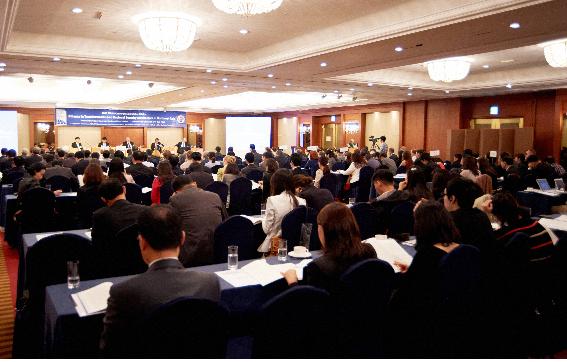
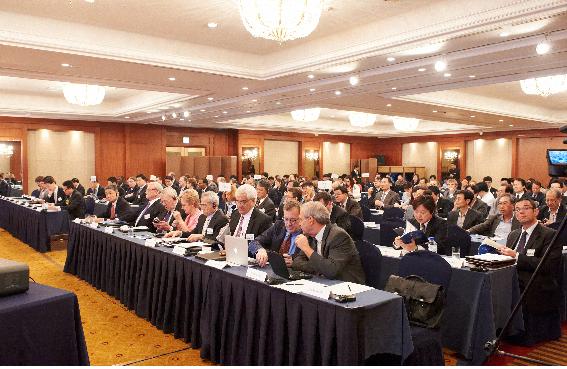
The conference was held on the topic of “Alliance in Transformation and Regional Security Architecture in Northeast Asia” with an opening session and three sessions.
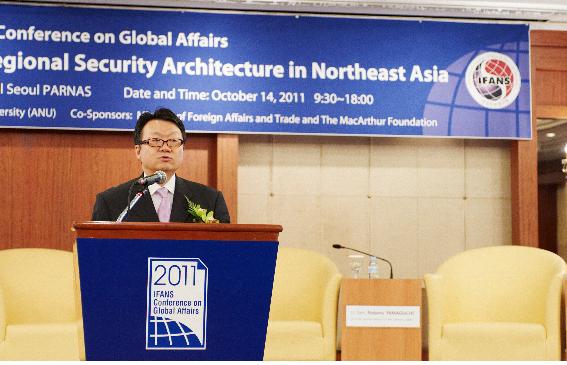
The opening session included IFANS Chancellor LEE Joon-gyu’s welcoming remarks, Grand National Party rep. CHUNG OK-Nim’s congratulatory remarks, Foreign Minister KIM Sung-hwan’s keynote speech (read by Chancellor LEE Joon-gyu).
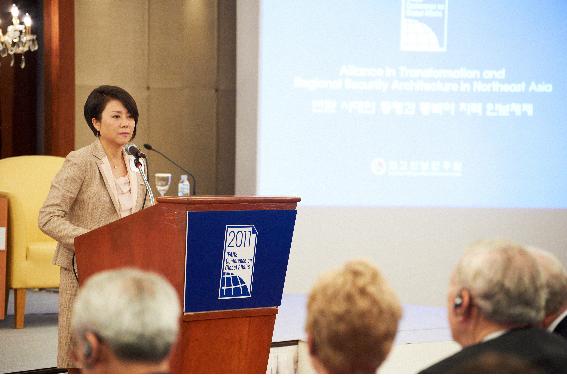
Opening Session: In his welcoming remarks, Chancellor LEE discussed the changing Northeast Asian security environment as well as ways to enhance and maintain current alliances. Rep. CHUNG from the ruling Grand National Party addressed the need for Northeast Asian countries to strengthen cooperation for economic growth and sustainable development. Minister KIM Sung-hwan stressed the importance of “total and complex diplomacy,” the need to further strengthen U.S.-South Korea alliance, as well as the need to promote multilateral security cooperation.
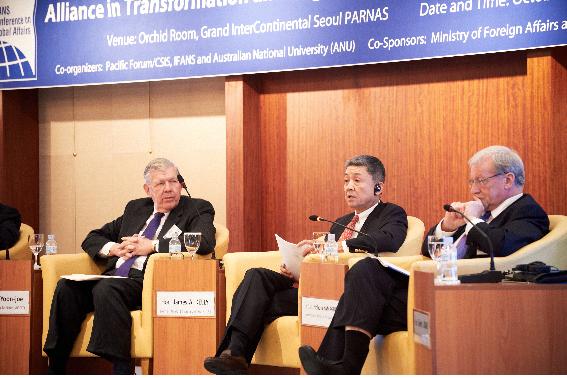
The moderator for the 1st Session, “Diplomatic Roundtable: Security Perspectives,” was Former Foreign Minister YOON Young-kwan.
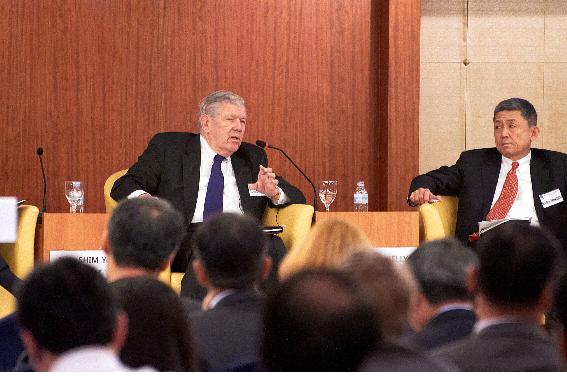
In the first session Former Deputy Foreign Minister SHIM Yoon Joe said denuclearizing North Korea may happen gradually, with Six-Party Talks, by maintaining economic and humanitarian access into North Korea, and with China’s help.
Former Assistant Secretary of State James KELLY expected that the U.S. will strengthen Alliance with East Asia partners while checking China’s rise. Meanwhile he said Japan will seek to strengthen its Self-Defense Forces with the on-going territorial dispute, China’s rising navy power, and with rising nuclear and missile threats from North Korea. China would have a hard time trying to dispel the international community’s fears of a China threat, considering its lukewarm behavior in dealing with territorial disputes and North Korea problem. Mr. Kelly also expects that North Korea will try to re-justify possessing nuclear weapons in the process of the third generation power succession.
Former Special Advisor to the Japanese Cabinet Noboru YAMAGUCHI stressed the importance of the U.S.-Japan Alliance and the extended deterrence while emphasizing Japan’s need to develop a “Dynamic Defense Force.”
Former Foreign Minister of Australia Gareth EVANS suggested that China and the U.S. both should make a mutual contribution to establish trust, in hopes for security and stability in their relations. Also he stressed the need for China to contribute in settling territorial disputes and play more critical role in solving North Korea problem.
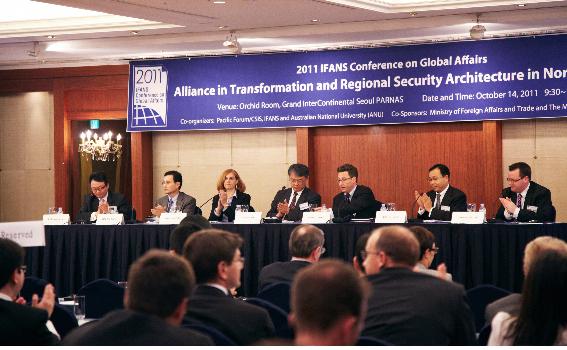
The moderator for the 2nd Session, “The Rise of China and its Implications,” was IFANS Chancellor LEE Joon-gyu.
In the second session, Professor from Catholic University KIM Jae Cheol claimed that concerns are rising among East Asian nations due to China's offensive and aggressive diplomatic posture.
Senior Fellow of the CSIS Bonnie GLASER said the U.S. and its allies should coordinate to shape the environment which will lead Chinese authorities to make decisions that contribute to peace and stability.
Professor from Japan’s Keio University Yoshihide SOEYA stressed the importance of South Korea-U.S.-Japan-Australia security cooperation to guard against Chinese unilateralism. He also asserted the importance of South Korea-Japan security cooperation.
Professor from Australia’s La Trobe University Nicholas BISLEY said Australia seeks a policy of hedging, and has been “building institutional mechanisms that generate regional security architecture.”
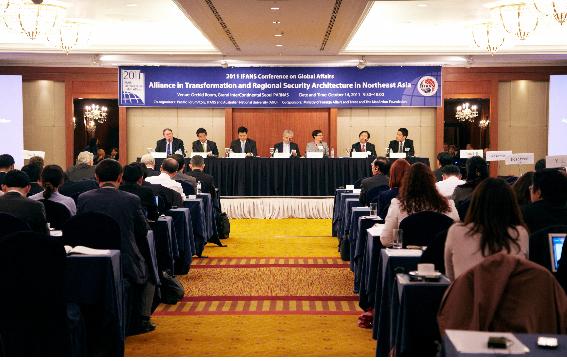
The moderator for the 3rd Session, “Agenda of Cooperation among the U.S. Allies: Regional and Global Affairs,” was Professor William TOW from Australian National University (ANU).
In the third session, Professor from Seoul National University PARK Cheol-hee said realistic countermeasures to China’s rise would be to enhance cooperation among middle powers—such as South Korea, Japan, and Australia—as a containment strategy.
Senior Program Officer of United States Institute of Peace (USIP) John Park said what’s at the center of multilateral alliance is spending limited U.S. defense budget effectively. He also stressed the importance of “networking” in establishing regional security architecture.
President of Research Institute for Peace and Security (RIPS) Masashi NISHIHARA addressed the need to cooperate on regional issues such as China’s military expansionism, cross-strait conflicts, North Korea’s adventurism, and Russia’s military reemergence, as well as the need to cooperate on global security issues including nuclear proliferation, terrorism, piracy, cyber attack.
Professor from ANU Rikki KERSTEN said, although Japan and Australia are seeking multilateral cooperation as part of a joint hedging strategy, Australia is hesitating to include India in the U.S.-Japan-Australia trilateral talks, since Australian economy heavily depends on China.
The IFANS Conference on Global Affairs is an annual event that IFANS had been hosting since 2011. The IFANS invite experts from different nations to discuss critical issues and increase the general public’s understanding on these issues. About 200 people participated in the event including experts, reporters, and students.
- Attached File
-
No attachments